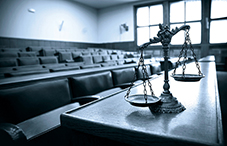

No matter your specialty or work setting, it's likely you will be asked to testify in court at some point in your career, to discuss a client evaluation, as an expert witness about a defendant or litigant, or as an authority in a psychological area. The thought of getting up on the witness stand can be daunting for many psychologists, says David DeMatteo, JD, PhD, of Drexel University's program in law and psychology. Some fear the public speaking aspect; others are nervous about having their work so publicly scrutinized.
"Particularly among early career professionals, it's a big source of anxiety," he says. "They wonder, ‘Do I really have the expertise to be testifying in court?'"
Knowing what to expect can make the difference between getting flustered and leaving the courtroom knowing you have played a valuable role in the legal process, say DeMatteo and other psychologists experienced in psycholegal issues.
Here is their advice for ensuring a smooth day in court.
Prepare well. Ask the lawyer to send you all the information he or she can to familiarize yourself with the case. Then use that information to draft answers to the likely flow of questions for the 30 minutes or more you'll be on the stand, says DeMatteo. Questions to expect during the direct examination are usually straightforward, says DeMatteo. If you're there to discuss an evaluation, for example, an attorney will likely ask you to state the purpose of your evaluation, describe how you conducted the evaluation and what your main findings were, says DeMatteo.
Cross-examination questions can be trickier to predict, but tend to focus on the limitations of your expertise, procedures or conclusions, such as, "Isn't it true that you cannot be 100 percent certain in your conclusion in this case?" For further insights, ask colleagues about the sort of questions they faced when they have testified. "Lean on your colleagues," says Kim Sanschagrin, JD, PhD, of Bel Air, Maryland, and a member of APA's Committee on Legal Issues. If you've never testified before, visit the courtroom ahead of time and practice walking up to the witness stand from where you'll be seated as a way to reduce your anxiety, says DeMatteo.
Use simple language. Psychologists often make the mistake of filling their testimony with jargon that is unfamiliar to the jury, says Sanschagrin. "If you're testifying on a statistical analysis, the jury's eyes might glaze over," she says. To avoid that, rehearse your answers with friends outside the field to see if they can follow your message. Ultimately, psychologists who testify should see their role as an educator of the court, says Joel Dvoskin, PhD, who offers workshops on testifying through the American Academy of Forensic Psychology. "‘Blowing them away' with complicated verbiage and sophisticated theories just encourages juries to dismiss an expert's input," he says.
Know the traps. The opposing attorney's job is to highlight flaws in your work and poke holes in your testimony. One strategy for undermining witnesses is asking several questions at once—often at length and with a slightly different interpretation of what you have just said—which can be tricky to follow. If you answer such compound questions too quickly, you run the risk of acknowledging any misinformation the attorney slipped in. To avoid that, be sure to ask the attorney to repeat the questions one at a time, says Sanschagrin. "Listen to questions very carefully and feel comfortable and assertive correcting what's wrong," adds Dan Murrie, PhD, of the University of Virginia.
Dictate the pace. Lawyers often try to conduct a cross-examination at a rapid pace as a way to confuse a witness, but "they can't make you answer fast," says Dvoskin. He advises witnesses to take control of the pace, pausing before speaking so they can concentrate on answering accurately. "If I am cut off on the witness stand, I usually turn to the judge and say on the record, ‘That wasn't my complete answer, would you like me to finish?'" he says. You can also slow the pace during rapid-fire questioning by taking a sip of water, adjusting your glasses or shifting your posture, says DeMatteo.
Watch your body language. Sitting with arms crossed can be seen as a defensive posture; scratching your head can be interpreted as a sign of confusion. Where you look while you're speaking is also important, says Sharon Kelley, PhD, JD, of the University of Virginia. Witnesses should look at the attorney as he or she is posing a question, but at the jury or judge (if there's no jury) while answering. "It's easy to get wrapped up in a one-on-one conversation with the attorney, but they are not the ones who need the information," Kelley says.
Acknowledge your limitations. No matter how thorough your evaluation, a good attorney may find some task you didn't do, says Murrie. If that happens, don't get defensive. Acknowledge the shortcoming and explain why you thought a certain step wasn't necessary or possible. And if you get a question you don't know the answer to, it's fine to say, "I don't know," says Dvoskin. "It's a perfectly good answer if it's true."
On Being an Expert Witness: It's Not About You
Dvoskin, J.A. & Guy, L.S. Psychiatry, Psychology and Law, 2008
Protecting Patient Privacy When the Court Calls
APA's Committee on Legal Issues
Monitor on Psychology, July/August 2016
The Expert Expert Witness: More Maxims and Guidelines for Testifying in Court
Brodsky, S.L. Washington, DC: APA, 1999